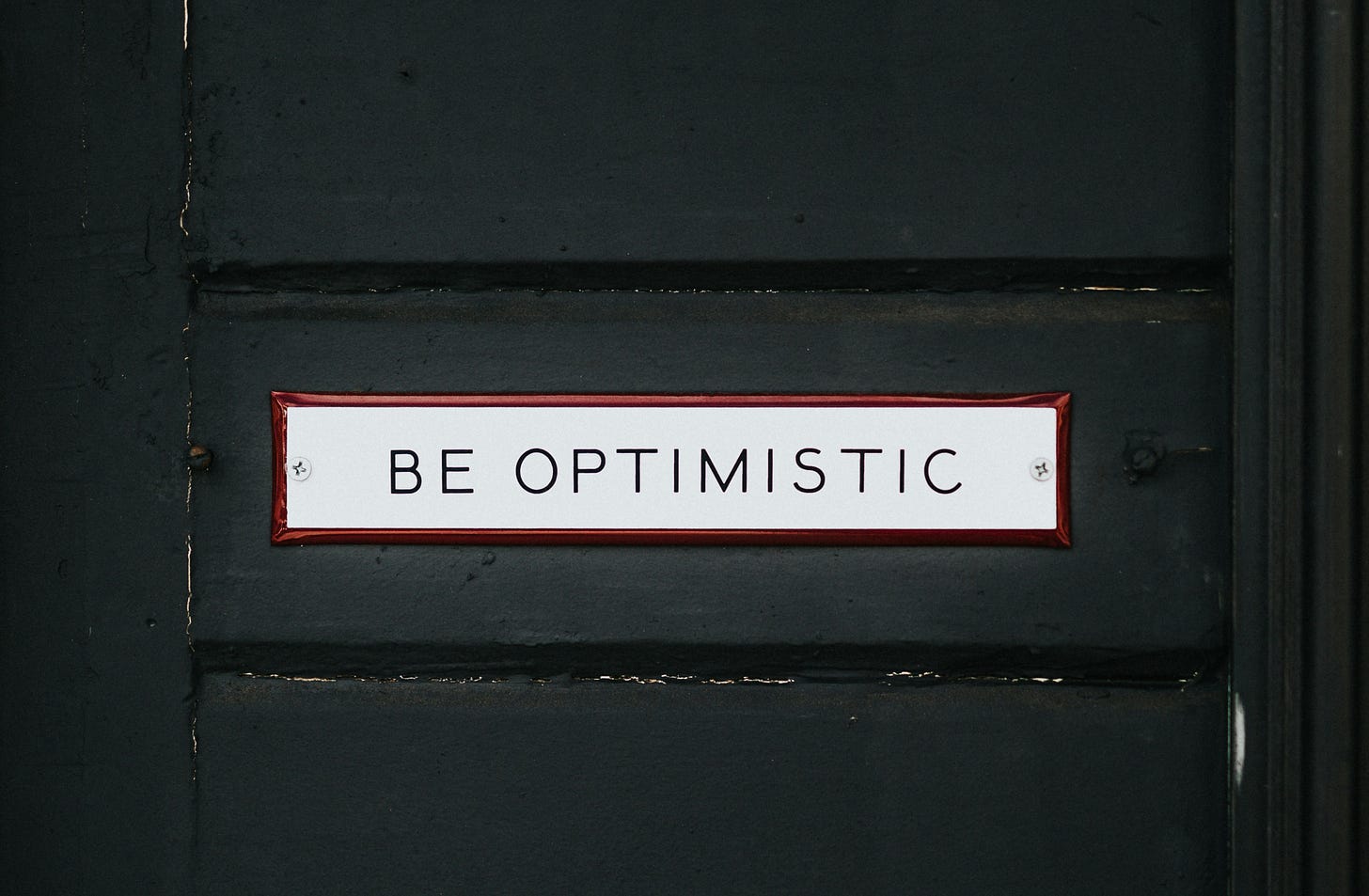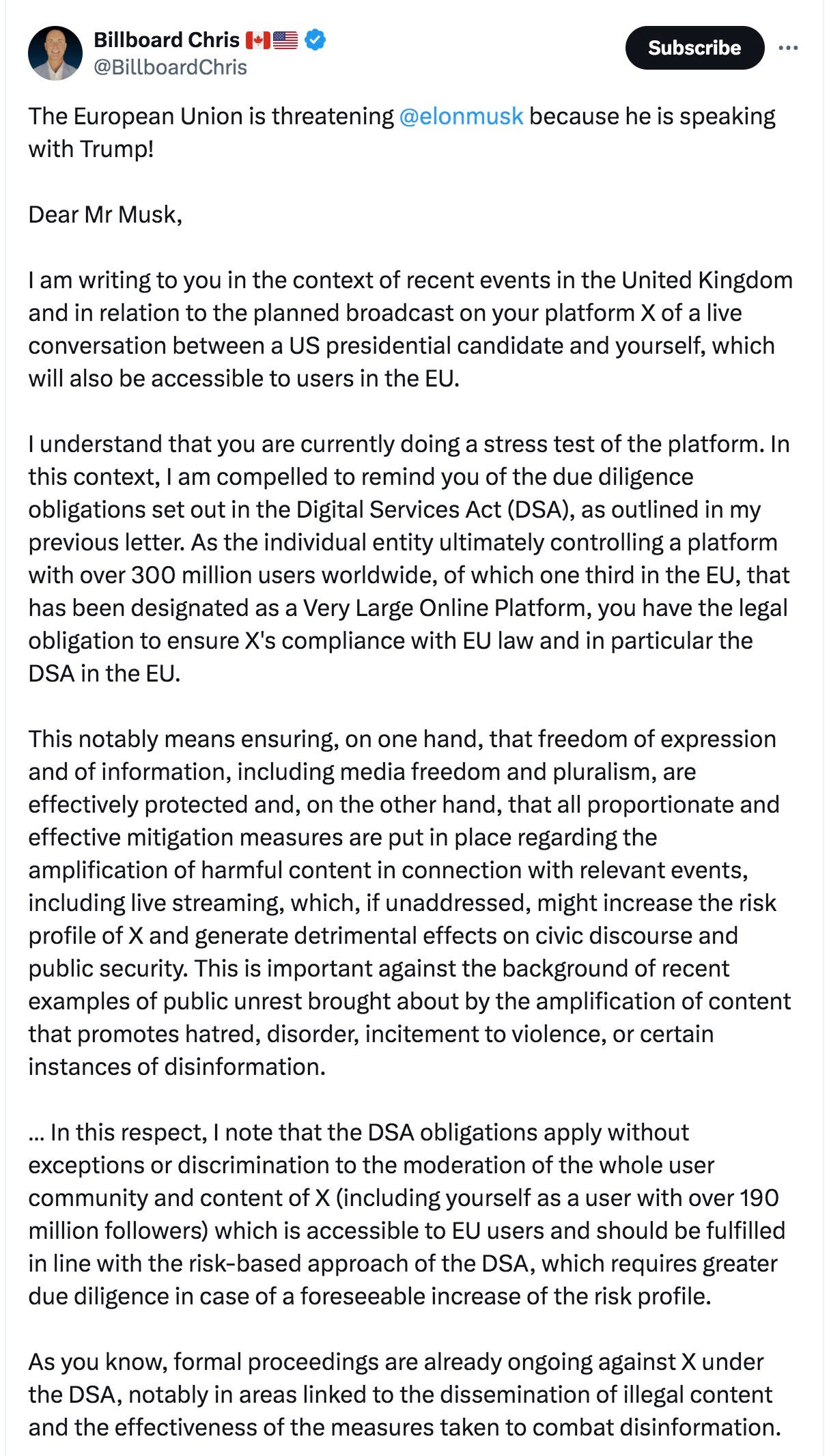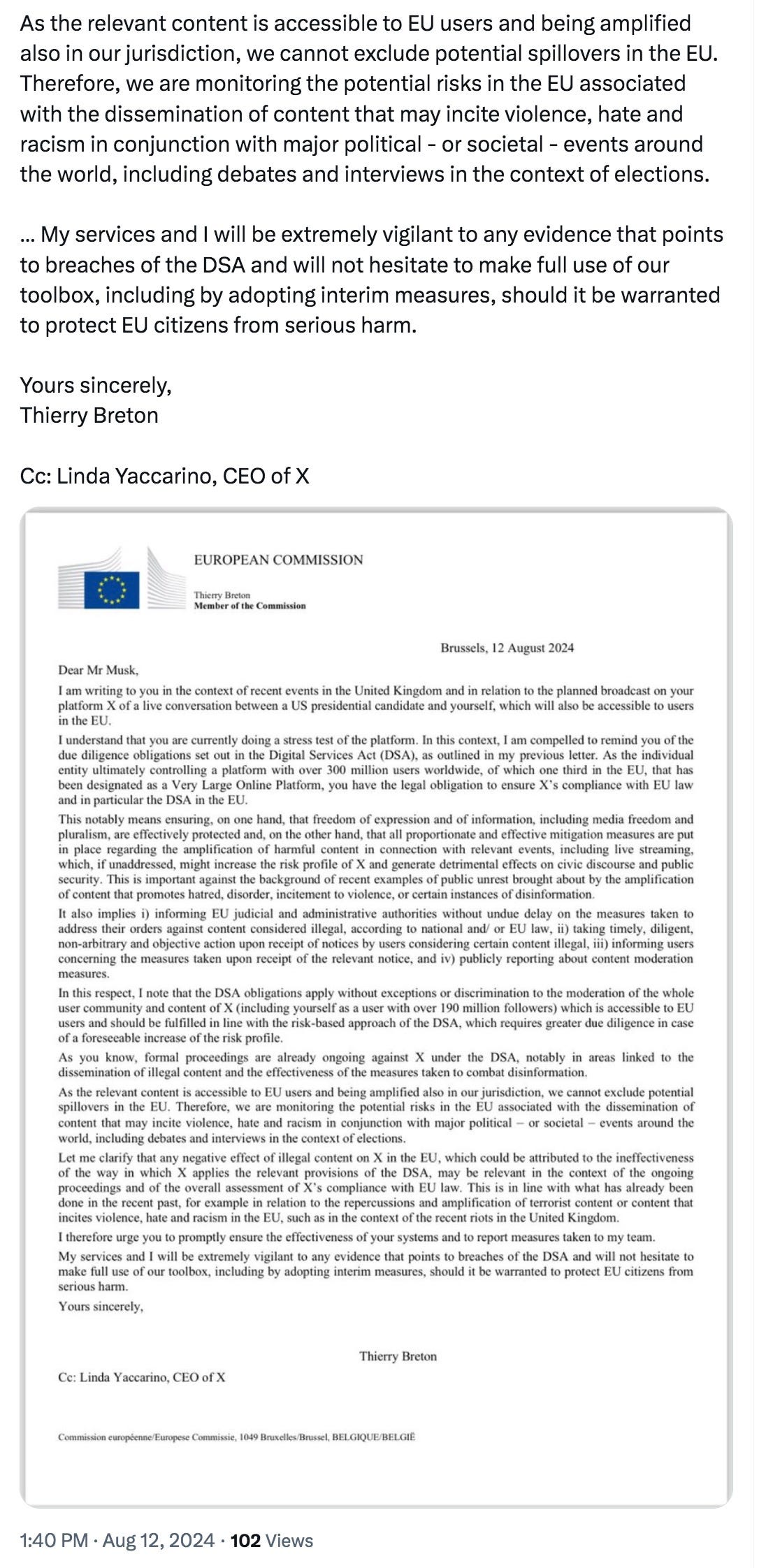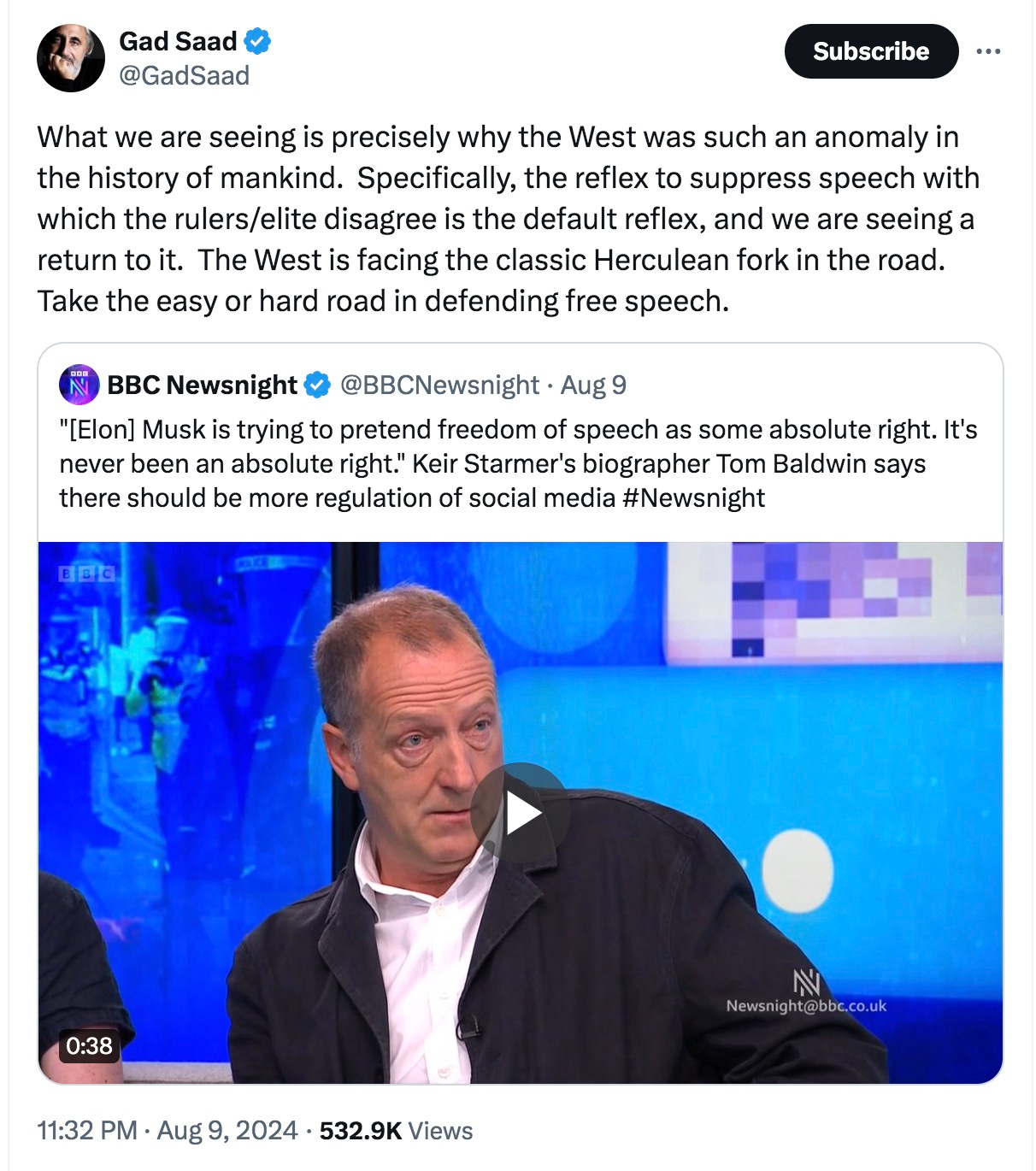E-Pluribus | August 12, 2024
Make litmus tests not great again; some actual diversity in Ivy League journalism; and reports of liberalism's death have been greatly exaggerated.
A round-up of the latest and best musings on the rise of illiberalism in the public discourse:
Zachary Marschall: DEI Litmus Tests Must End
Most universities would suggest they exist not simply to educate but to broaden the minds of their students. Writing for Real Clear Education, Zachary Marshall argues that litmus tests, notably DEI statements, tend to do the opposite. Trying to right past discrimination with present discrimination will only extend the errors of the past to yet another generation.
Ideological litmus tests have no place in higher education. They weaponize loyalty and contradict the university’s purpose of fostering academic inquiry and informed debates. Scholars cannot pursue truth or progress if they are denied academic jobs based on their devotion to a specific political ideology or philosophy.
[. . .]
DEI litmus tests must go because they do not serve students. In reality, they are about power. DEI loyalty oaths fortify campus leaders’ power to reduce diversity, equal opportunity, and access initiatives to a set of counterproductive far-left policy prescriptions that ultimately marginalize, limit, and exclude students.
[. . .]
. . .DEI statements are not just for getting a job in academia, they are too often needed for promotion and advancement. In 2022, the American Association of University found that 45.6% of “large” universities — where the most prestigious research takes place — require “DEI criteria in tenure standards.” Tenured professors are at the top of the academic food chain. They sit on curriculum, hiring, and programming committees, and have the greatest access to funding and publication resources.
Those academics that get the top spots get to dictate who is worthy of inclusion or exclusion in the academic job market. A scholar marked unfit might as well be branded with a “Scarlet Letter” confirming his ostracization from higher education. These DEI zealots are the same people teaching the next generation of educators, parents, business leaders, and politicians.
That is why leaders outside of higher education must step in to strip undue power away from ideologically driven administrators and professors. Ideologues and their administrative allies are grafting divisive politics onto their institutions, erroneously marketing their insertions as sutures for past injustices. That is not the purpose or the design of higher education.
Read it all here.
Lexi Boccuzzi: Heterodox Journalism in the Ivy League
Ideologically, the faculty and administration of most colleges tend to skew to the left. This is generally true of the student population also, though to a lesser degree. Student-run campus organizations, including publications, usually reflect this. However, writes Lexi Boccuzzi at City Journal, there’s currently something of a renaissance in Ivy League student newspapers with a more right-leaning orientation.
The [Sundial’s] mission [a Columbia University student newspaper] is to avoid an “ideological line” and instead challenge its readers and writers to “become intellectually vigorous, emotionally resilient, and morally stronger.” Publishing a range of opinion and reporting, the Sundial has prioritized controversial issues. The paper played a key role in covering the anti-Israel protests that disrupted Columbia this spring, showing the university community that reasonable people can have fundamental disagreements while still doing quality journalism.
The lock-step orthodoxy enforced by many elite-school papers should come as no surprise, given their staffs’ typical ideological makeup. In its 2023 Diversity, Equity, Inclusion, and Belonging (DEIB) report, the Daily Princetonian found that 90.2 percent of its editors identified as “left-wing.” This tracks closely with figures from professional journalism. A 2022 study conducted by the Syracuse Newhouse School of Journalism found that only 3.4 percent of journalists identified as Republican, compared with 25 percent in 1971.
The imbalance has motivated many, like Harvard Salient editor-in-chief and rising senior Alex Hughes, to start or revive explicitly conservative publications. Hughes explained, “While I appreciate those who try to promote heterodox ideas through left-leaning publications, I think our editorial independence allows us to make arguments and discuss issues that other papers wouldn’t address. . . . A conservative community of the strength, size, or closeness of the one we’ve been able to build simply couldn’t exist under the auspices of a publication like the Crimson.”
Hughes also pointed out that the Salient’s openly conservative editorial stance allows it to platform and normalize right-of-center ideas in the broader campus environment. “I think the Salient exposes our classmates to questions and ways of thinking—in other words, a worldview—with which they are familiar only through unflattering portraits painted by liberal media and professors,” he said.
[. . .]
A few longstanding center-right outlets have been crucial to sustaining and cultivating intellectual vitality at Ivy League schools. These publications have become particularly important, given that youth-mobilization efforts on campus have frequently focused on cultivating populist or reactionary voices. The Dartmouth Review and the Princeton Tory are two of the best-known and most vibrant of these publications. Dartmouth Review editor-in-chief and rising senior Zoe Dominguez said that she found this center-right tradition attractive. “The ‘conservative’ club on campus at the time essentially functioned as an unaffiliated chapter of Turning Point USA, which wasn’t the sort of outlet I was looking for. I sought out a group with a more intellectual, or at least discursive, ethos, and I found that in the Dartmouth Review.” The Review, she explained, is an independent publication “governed by an ideology that transcends the staunch left-or-right stance society often takes.”
Read the whole thing.
Jonathan Rauch: Why You Should Feel Good About Liberalism
2024 is an election year, so apocalyptic rhetoric is par for the course. That said, there are legitimate concerns about the level of commitment Western societies have to the principles that ushered in an unprecedented wave of freedom and prosperity. However, at Persuasion, Jonathan Rauch says there are still plenty of reasons for optimism.
[W]hat do we (or at least I) mean by liberalism?
Not progressivism or moderate leftism, as the term came to mean in postwar U.S. discourse. Rather, liberalism in the tradition of Locke, Kant, and the Founders. It is not one idea but a family of ideas with many variants. Its central philosophy is that all persons are born free and equal. Its operational principles include the rule of law, pluralism, toleration, minority rights, distributed authority, limited government, and (subject to the other requirements) democratic decision-making. Its distinctive method of social organization is to rely on impersonal rules and open-ended, decentralized processes to make collective decisions.
Embodying those notions are three interlinked social systems: liberal democracy to make political choices; market capitalism to make economic choices; and science and other forms of open critical exchange to make epistemic choices (that is, decisions about truth and knowledge). By transcending tribe, renouncing authoritarianism, substituting rules for rulers, and treating persons as interchangeable, liberalism achieves what no other social system can offer, at least on a large scale: coordination without control. In a liberal system, everyone can participate but no one is in charge.
In the context of human history, everything about liberalism is radical: its rejection of personal and tribal authority, its insistence on treating persons as interchangeable, its demand that dissent be tolerated and minorities protected, its embrace of change and uncertainty. All of its premises run counter to hardwired human instincts. Liberalism is the strangest and most counterintuitive social idea ever conceived, a disadvantage offset only by the fact that it is also the most successful social idea ever conceived.
Of course, it is imperfect. It does not solve every old problem and new problems always crop up. But all of the big social problems, from poverty and inequality to environmental degradation, war, and disease, are demonstrably better handled by liberal than non-liberal societies. It is no exaggeration to say that this strangely successful social technology has allowed Homo sapiens to form global networks of positive-sum cooperation that have elevated human achievement orders of magnitude above our designed capacity. Liberalism has literally transformed our species.
[. . .]
It is unfortunately a fact, and not a new fact, that liberalism does not adequately provide for people’s moral and spiritual needs. Many people feel left behind economically, marginalized culturally, ignored politically, disconnected socially, and hungry spiritually. Hillary Clinton, who was mocked at the time for her speech, deserves an apology. She was right; there was a crisis of meaning, and there still is.
But is that liberalism’s fault? After all, liberalism was designed not to provide for our moral and spiritual needs. It deliberately leaves the transcendent questions open. From the beginning, liberal theorists emphasized that liberalism can provide space for individuals, families, communities, and faiths to make meaning in their own ways, but it cannot, does not, and should not do that work itself. Liberalism promises the pursuit of happiness, not the actual thing.
[. . .]
[T]he current crisis—and the crisis observed by Tocqueville and Nietzsche and Carter and Clinton—is not so much a failure of liberalism as it is a failure of the institutions around liberalism. For all kinds of reasons beyond the scope of this article, society’s meaning-making institutions have not stepped up. In particular, the secularization and politicization of American Protestantism—perhaps still, despite its travails, America’s spiritual taproot—has proved catastrophic. (That’s the subject of my next book, so I won’t elaborate here.) But more generally, if churches preach politics, if schools neglect citizenship, if businesses are mercenary, if politics becomes performative, if voters become cynical, if media becomes propagandistic, if communities crumble, and if families fragment—well, in that case, liberalism will not save us.
Read it all.
Around Twitter (X)
As Elon Musk prepares to interview Donald Trump on Twitter/X tonight, the European Union is warning Musk about EU rules regarding the “amplification of harmful content” by a “Very Large Online Platform” (no, I am not making that up).
Speaking of Musk and Twitter/X, here’s Gad Saad on the future of free speech:
And finally, the more things change, the more they stay the same.










